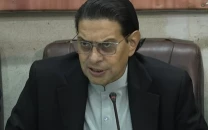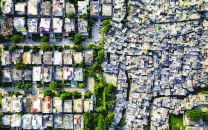World Habitat Day 2011: Lahoris reminisce Canal’s grandeur, lament felling of trees
Environmentalists bemoan govt short-sightedness vis-à-vis natural habitat.

“To see such lush green trees being cut saddens me,” Farooq laments. Like him, a majority of Lahore’s residents are unhappy with the widening of the road on either side of the canal.
After a five-year legal battle between environmentalists and the Punjab government, the Supreme Court in September allowed for partial felling on trees along a seven-kilometre-long patch of the canal, to pave the way for road widening.
“Visiting the Canal Road is painful. I cannot see the trees being felled,” says Imrana Tiwana from the Lahore Bachao Tehreek, the person behind the petition which demanded the end of the road widening project.
“At 18% annually, Lahore has the highest rate of increase of vehicular traffic,” she says. “In two years, the road will be clogged again.”
Widening the road is also a clear violation of UN Charter for Environment and Heritage, which Pakistan is a signatory to, she adds.
Ad-hoc policy decisions
Others echo Tiwana’s frustration.
“We struggled for five years but we lost,” says Ali Hassan Habib, Director General for World Wide Fund for Nature Pakistan (WWF), and a petitioner along with Tiwana.
According to Habib, Lahore, the second largest city of Pakistan, does not even have a master plan.
“The government’s policy to protect natural sites, cultural heritage and wildlife is weak. It is not a priority for them,” he adds.
Renowned town planner and a member of the court’s mediation committee, Arif Hassan, disassociated himself with the recommendations given in the verdict on the road widening project.
The Punjab government should focus on traffic management instead of taking ad hoc decisions and destroying the natural habitat and cultural heritage, he feels.
Hassan says not a single tree should be cut in favour of an automobile. “Felling of those trees was not needed at all,” he says. The problem is not restricted to Lahore though. Pakistan’s policymakers do not have a plan for saving natural habitat and restoring heritage in this country, Hassan adds.
Accelerating deforestation
According to the United Nations, Pakistan has just 2.5% of its surface area with forest cover and an alarming rate of deforestation at 2.1%, the highest in Asia.
The UN’s Convention on Biological Diversity stated in a recent report that the ecological trend of greatest concern in Pakistan today is the continuing loss, fragmentation and degradation of natural and modified habitats.
While this loss has been taking place in Pakistan for centuries, the last few decades have seen a particularly rapid acceleration, the report adds.
“Pakistan has been a pioneer in forming a national policy for conservation. But it exists only on paper,” says Kamil Khan Mumtaz, one of the members on the board of governors for Pakistan National Fund for Cultural Heritage and a petitioner against the Canal Road Widening Project.
“Even when the government tries to preserve sites, for example the Wazir Khan Mosque in Lahore, and Katasraj Temple in Chakwal, they ruin it further,” he says.
“The Supreme Court’s decision disappointed us, since … [it] did not stop the damage from happening,” Mumtaz adds.
There is some relief though since the Supreme Court’s decision asks the government to plant four saplings for every tree it fells.
It will, therefore, take at least six to seven decades to regain what will be lost in a few minutes.
Published in The Express Tribune, October 3rd, 2011.



















COMMENTS
Comments are moderated and generally will be posted if they are on-topic and not abusive.
For more information, please see our Comments FAQ